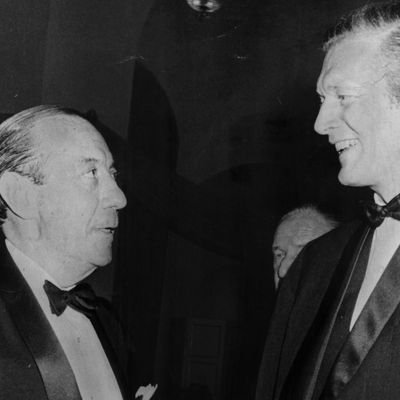
Today we largely take for granted a two-party political system with one liberal and one conservative major party that are sharply polarized between economic and cultural ideologies and constituencies. But not that very long ago, things were much more fluid, particularly in New York City, where the political sweet spot was well left of center, and third and fourth parties played an influential role in major-party politics. Fifty years ago today, Gotham witnessed a mayoral primary for the ages, in which two of the city’s liberal icons lost the Democratic and Republican primaries to Italian-American conservatives, setting up a general-election triumph for the Liberal Party and putting an ideological realignment in motion.
The 1969 mayoral election was supposed to be a classic matchup between incumbent liberal Republican John Lindsay, the Wasp-y former congressman from Manhattan’s so-called Silk Stocking District, and his predecessor, the former three-term Democratic mayor Robert F. Wagner Jr., the son of legendary New Deal senator Robert F. Wagner Sr. Wagner the Younger had compiled a solid liberal record (marred by his persecution of gay New Yorkers as part of a “cleanup” prior to the 1964 World’s Fair) and burnished his “reform” credentials by breaking with and crushing Tammany Hall in his successful 1961 campaign. Lindsay had won the Liberal Party ballot line en route to a 1965 win that made him a national celebrity and brought back distant memories of Fiorello La Guardia’s GOP “fusion” tickets and their liberal appeal.
But the matchup wasn’t to be. By 1969, New York City was experiencing an outer-borough backlash to Manhattan-based liberalism, which was perceived as weak on rapidly rising crime and too inviting to minority migrants from the South and Puerto Rico who wound up depending on the city’s generous public-assistance benefits. In addition, the usually dominant Democratic Party was riven by racial and ethnic rivalries.
In the 1969 Democratic mayoral primary, Wagner was challenged on the left by Bronx borough president (and later congressman) Herman Badillo, the first Puerto Rican to run for mayor of a major U.S. city, and by the literary-celebrity ticket of Norman Mailer (as the mayoral candidate) and Jimmy Breslin (running for City Council president), which naturally attracted a lot of media attention. But the real surge came on Wagner’s right, as city comptroller Mario Procaccino, who ran a law-and-order campaign tinged with racist appeals, rode strong performances in Queens and Staten Island to a narrow-upset plurality win over Wagner and Badillo. When Procaccino died in 1995, the New York Times recalled some lowlights from his 1969 campaign:
While other candidates in the mayoral primary spoke of the need for conciliation and social vision and a better break for the city’s blacks and poor and aged, Mr. Procaccino, comptroller from 1966 to 1970, was on the sidewalks of the white middle- and lower-middle-class neighborhoods of the Bronx, Queens and Staten Island, pounding home his theme:
“We must stop coddling the criminals and pampering the punks,” he would roar. “The do-gooders and bleeding hearts must stop handcuffing the police.”
He liked to say, “It’s safer to be in Vietnam than to be in New York at three o’clock in the morning.” He often told his audiences what he would do if he caught a burglar in his home: “I wouldn’t run for the handbook. I wouldn’t call my lawyer. I’d just blow his brains out.”
And yes, those were the words of the Democratic mayoral nominee in the perceived capital of liberalism.
Meanwhile, Lindsay, whose increasingly liberal mayoral administration did a lot to fuel the outer-borough backlash, was nonetheless backed by GOP luminaries ranging from Tom Dewey to Nelson Rockefeller to the state’s two Republican senators (Jacob Javits and Charles Goodell). Yet the incumbent lost the nomination to Staten Island state senator John Marchi, who had already won the general-election ballot line of the Conservative Party, which had been formed earlier in the decade to counter the Liberal Party’s influence on the GOP. It was a notably ideological outcome, as a later historian explained:
An unknown, underfinanced, charismatically challenged conservative candidate defeated one of the country’s leading liberal Republicans in a party primary. The Conservative Party had claimed its first notable victim and had begun to reshape the ideological makeup of the state GOP.
It was a sign pointing ahead to the rightward reorientation of the Republican Party in New York and nationally — in particular the shocking 1970 election of Conservative nominee James L. Buckley to the U.S. Senate.
But 1969’s fireworks didn’t end with the primaries: Smartly claiming the ideological high ground against two relatively conservative major-party opponents, Lindsay went on to win a second term in the general election on the Liberal ballot line with 42 percent of the vote (winning 67 percent in Manhattan), as Procaccino struggled to win minority voters and Marchi was stuck with a narrow Republican-Conservative base. This signaled the beginning of the end for both conservative Democrats and liberal Republicans. Javits, one relic of the latter once-powerful faction, would hang on to his senate seat until 1980 before losing the GOP nomination to Al D’Amato and then failing to replicate Lindsay’s Liberal-line win in the general election. Lindsay would soon switch parties and run (unsuccessfully) for the Democratic presidential nomination in 1972. And Wagner would briefly consider running for mayor one more time with the backing of Republicans in 1973, before bowing out. He served briefly as President Jimmy Carter’s personal envoy to the Vatican before full diplomatic relations with the Holy See were resumed in 1984.
After 1969, New York’s two major parties were never the same.






























